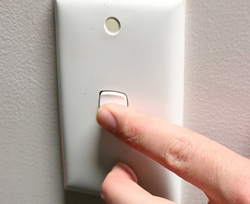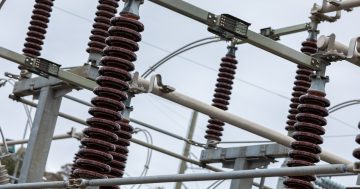Energy costs are through the roof right now. Erin Gobler* says there’s one simple thing everyone can start doing to save money.
 Utility bills are skyrocketing across the US. Combined with increasing rent rates and rising prices for gas and groceries, you might find this is putting some strain on your monthly budget.
Utility bills are skyrocketing across the US. Combined with increasing rent rates and rising prices for gas and groceries, you might find this is putting some strain on your monthly budget.
One of easiest and most effective ways to reduce your energy bill is turning off your lights when you aren’t using them. (We also recommend unplugging these household devices, adjusting the temperature of your thermostat and weatherstripping.)
Keep reading to learn why it’s important to turn off your lights and how much money this simple habit can save you.
Why you should turn off your lights
You’ve probably been told time and time again the importance of conserving energy, but you might be wondering why it’s important.
First, reducing your energy usage by turning off your lights is an excellent way to reduce your carbon footprint.
Electricity generation is one of the biggest sources of carbon emissions that contribute to climate change.
By turning off your lights when you aren’t using them, you can do your part to reduce carbon emissions and therefore help the environment.
And reducing your home’s energy usage doesn’t just help the environment — it also helps your wallet.
Turning off lights when you don’t need them can help to reduce your electricity bills.
You’ll also extend the life of your light bulbs, which will save you money as well.
Here’s how much money you can save by turning off the lights
The amount you can save on your electricity bill by turning off your lights depends on the type of light bulb you use.
You can figure your potential savings using the light bulb’s wattage.
Let’s say you have a light bulb that’s 40 watts, meaning that in one hour, the bulb will use 0.04 kWh.
Then, you can use your electricity price — which you can find on your most recent utility bill — to figure out how much you’ll save for that hour.
In the case of the 40-watt bulb, if you pay an electricity rate of 10 cents per kWh, your savings by turning that bulb off for one hour would be 0.4 cents.
Now, it’s easy to see that number and think it’s simply not worth it to turn off your lights more often.
After all, what difference does 0.4 cents make?
First, remember that estimate is for a 40-watt bulb.
If you have higher-wattage light bulbs, then the savings will be greater.
Next, that estimate uses an energy price of 10 cents per kWh, but in many areas, the price of electricity may be higher than that.
Finally, our estimate looked at the savings of turning off one bulb for one hour.
You likely have many light bulbs in your house, and there are far more than just one hour in a month.
So when you calculate the savings of turning off all of your light bulbs for many more hours per month, your savings will increase significantly.
This small change means big savings in the long run
Turning off your lights when you aren’t using them is one of the most basic steps you can take to reduce your energy usage and save money on your electricity bill.
Just remember that even a small change can add up to big energy savings for you and also help reduce your carbon footprint.
*Erin Gobler is a personal finance writer based in Madison, Wisconsin. She writes about topics including budgeting, student loans, credit, mortgages, investing, and insurance.
This article first appeared at cnet.com.











